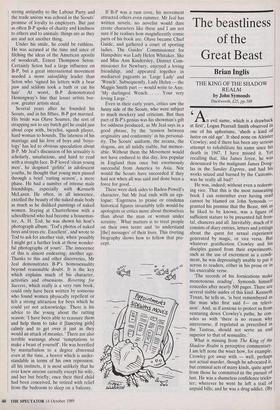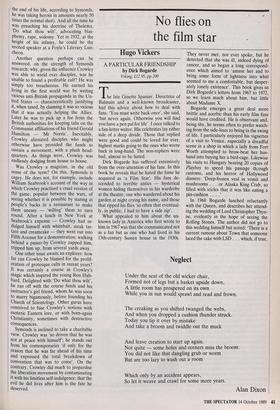The beastliness of the
Great Beast
Brian Inglis
THE KING OF THE SHADOW REALM by John Symonds
Duckworth, £25, pp.588
An evil name, which is a drawback at first', Logan Pearsall Smith observed in one of his aphorisms, 'sheds a kind of lustre on old age'. It shed none on Aleister Crowley; and if there has been any serious attempt to rehabilitate his name since his death in 1947, I have missed it. Yet recalling that, like James Joyce, he was denounced by the malignant James Doug- las in the Sunday Express, and had his works seized and burned by the Customs, was he really all bad?
He was, indeed; without even a redeem- ing vice. That this is the most nauseating book I can remember ever having read cannot be blamed on John Symonds granted his premise that the Beast, 666 as he liked to be known, was a figure of sufficient stature to be presented full fron- tal, chancres and all. Inevitably, much of it consists of diary entries, letters and jottings about the quest for sexual experience generated by magic, or vice versa. But whatever gratification Crowley and his disciples gained from their experiments, such as the use of excrement as a condi- ment, he was depressingly unable to put it across to readers, either in his prose or in his execrable verse.
`The records of his fornications make monotonous reading', Symonds himself concedes after nearly 500 pages. There are several risible asides of this kind. Kenneth Tynan, he tells us, 'is best remembered as the man who first said f— on televi- sion'. And, as if anxious to protect us from venturing down Crowley's paths, he con- soles us with 'there is no reason why intercourse, if regulated as prescribed in the Tantras, should not serve an end superior to that of sensuality.' What is missing from The King of the Shadow Realm is perceptive commentary. I am left none the wiser how, for example, Crowley got away with — well, perhaps not actual murder, though he advocated it, but criminal acts of many kinds, quite apart from those he committed ..in the pursuit of lust. He was a shameless confidence tricks- ter; wherever he went he left a trail of unpaid bills; and he was a drug addict. (By the end of his life, according to Symonds, he was taking heroin in amounts nearly 50 times the normal shot). And all the time he was preaching his doctrine of Thelema, `Do what thou wilt', advocating blas- phemy, rape, sodomy. Yet in 1932, at the height of his infamy, he could be the invited speaker at a Foyle's Literary Lun- cheon.
Another question perhaps can be answered, on the strength of Symonds research; why, given the influence Crowley was able to wield over disciples, was he unable to found a profitable cult? He was simply too treacherous. He earned his living in the first world war by writing vicious anti-British propaganda in the Un- ited States — characteristically justifying it, when taxed, by claiming it was so vicious that it was actually helping the Allies. Later he was to pick up a fee from the British authorities for keeping tabs on the Communist affiliations of his friend Gerald Hamilton — 'Mr Norris'. Inevitably, Crowley alienated disciples who might otherwise have provided the funds to sustain a movement, with a plush head- quarters. As things were, Crowley was endlessly dodging from house to house.
Was Crowley a magician, in the old sense of the term? On this, Symonds is cagey. He does not, for example, include William Seabrook's account of the way in which Crowley practised a cruel version of the game, popular between the wars, of seeing whether it is possible by staring at people's backs in a restaurant to make them uneasy — 'willing' them to turn round. After a lunch in New York at Seabrook's expense — Crowley had in- dulged himself with whitebait, steak tar- tare and creamcake — they went out into Fifth Avenue for a demonstration: walking behind a passer-by Crowley zapped him, tripped him up, from several yards away. One other issue awaits an explorer: how far can Crowley be blamed for the prolif- eration of grotesque cults in recent years? It was certainly a course in Crowley's magic which inspired the young Ron Hub- bard. Delighted with 'Do what thou wilt', he ran off with the course funds and his instructor's girl friend, whom he was soon to marry bigamously, before founding his Church of Scientology. Other gurus have contrived to fuse Crowley's notions with esoteric Eastern lore, or with born-again Christianity, sometimes with destructive consequences.
Symonds is inclined to take a charitable view. Crowley was 'so driven that he was not at peace with himself ; he stands out from his contemporaries 'if only for the reason that he was far ahead of his time and expressed the total breakdown of convention that was to come'. On the contrary, Crowley did much to jeopardise the liberation movement by contaminating it with his limitless self-indulgence; that the evil he did lives after him is the fate he deserved.



























































 Previous page
Previous page